Ready to Share Your Knowledge? Find Your Perfect Online Course Platform
Want to monetize your expertise and connect with a wider audience? Selling online courses is a smart move, but choosing the best platform to sell online courses can be tricky. This list dives into the top 8 platforms for 2025, perfect for Shopify store owners and creative entrepreneurs like you. Discover which platform best suits your needs, whether you're looking for seamless Shopify integration or robust marketing tools. We'll compare Tevello, Thinkific, Teachable, Kajabi, Podia, LearnWorlds, Udemy, and WordPress with LearnDash, helping you overcome the technical hurdles and start sharing your valuable skills.
1. Tevello
For Shopify store owners looking to expand their offerings and tap into the lucrative world of online courses, Tevello emerges as a leading contender among the best platforms to sell online courses. It offers a seamless integration that transforms your existing Shopify store into a comprehensive education hub. Instead of redirecting customers to external learning platforms, Tevello keeps them engaged within your familiar storefront, streamlining the purchase process and reinforcing your brand identity. This makes it particularly attractive for businesses like arts and crafts sellers who already have a Shopify presence and want to add educational content like workshops or technique tutorials directly within their existing shop. Think of a pottery artist selling both ceramic pieces and online pottery classes, all within the same online store.
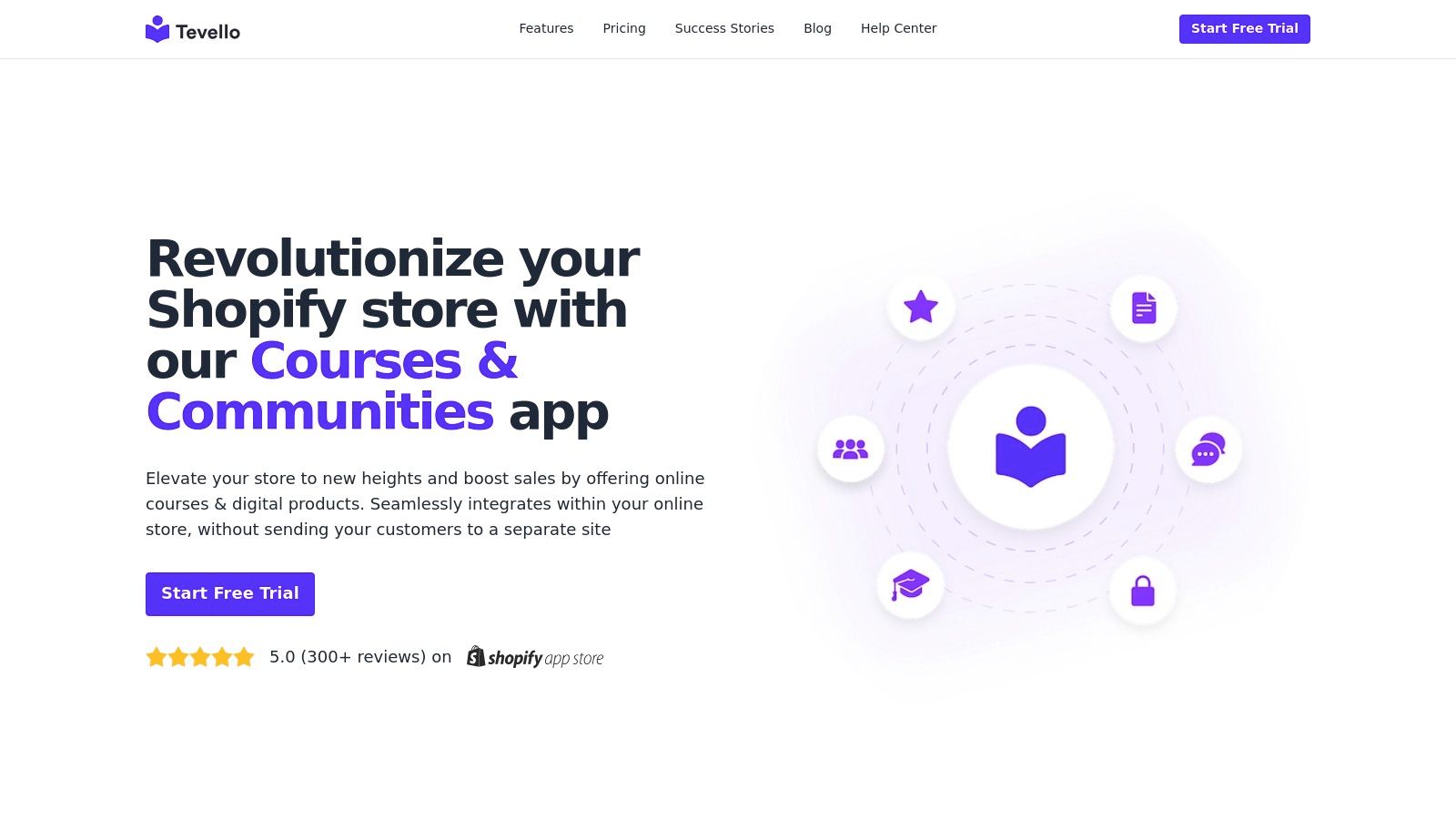
Tevello supports diverse course formats, from drip-fed content and interactive workshops to comprehensive certification programs. This allows for maximum flexibility in crafting educational offerings tailored to your specific audience. Whether you're a seasoned professional offering masterclasses or a beginner sharing foundational skills, Tevello can accommodate your needs. The platform's robust community building tools, including open, private, secret, and hidden groups, provide opportunities to foster deeper customer engagement and drive sales through exclusive member-only course access. Imagine a knitting supplies store offering exclusive knitting patterns and video tutorials to members of their premium community group. This fosters loyalty and provides additional value, encouraging repeat purchases.
Tevello’s deep Shopify integration automates key processes like customer onboarding, course enrollments, and notifications through Shopify Flow, significantly reducing manual administrative tasks and improving operational efficiency. This automated workflow is a major advantage, freeing up time for creators to focus on content development and student interaction. The platform also boasts robust video hosting capabilities, both natively and through integrations with external providers, and offers multi-lingual support, broadening your potential reach to a global audience.
Pros:Seamless Shopify integration: Automated onboarding and course management via Shopify Flow simplifies administration.
- Diverse course formats: Supports drip content, interactive workshops, and certifications.
- Robust community building: Varying visibility levels enhance engagement and drive sales.
- Multi-lingual functionality & video hosting: Expands global reach and content delivery options.
- Proven success: Highly rated with 300+ five-star reviews and demonstrable revenue growth for users. The success story of Crochetmilie, generating $112K in digital revenue from over 4,000 course sales, highlights the platform's potential.
Cons:
- Shopify ecosystem: Primarily designed for Shopify store owners, limiting use outside this platform.
- Advanced customization: While excellent developer support is available, complex setups may require assistance.
Pricing: No hidden charges. Just $29/Month
Website: https://tevello.com
Tevello's place on this list is solidified by its comprehensive Shopify integration, automated workflows, and diverse course and community features, making it a powerful solution for Shopify store owners seeking the best platform to sell online courses and elevate their business through digital education.
2. Thinkific
Thinkific is a robust platform ideal for creators seeking extensive control over their online course business. It stands out among the best platforms to sell online courses due to its focus on white-labeling and branding customization, empowering you to create a truly unique learning experience. This makes it a particularly compelling option for Shopify store owners and arts and crafts business owners who already have established brands and want to extend their reach through educational content. Whether you're looking to monetize your crafting expertise or offer supplementary product training alongside your Shopify store, Thinkific provides the tools to integrate seamlessly with your existing brand. Thinkific empowers you to create, market, and sell online courses with complete ownership over your content and pricing strategy. This comprehensive platform offers a wide range of features designed to streamline every aspect of your online course business, from course creation and student engagement to marketing and sales.
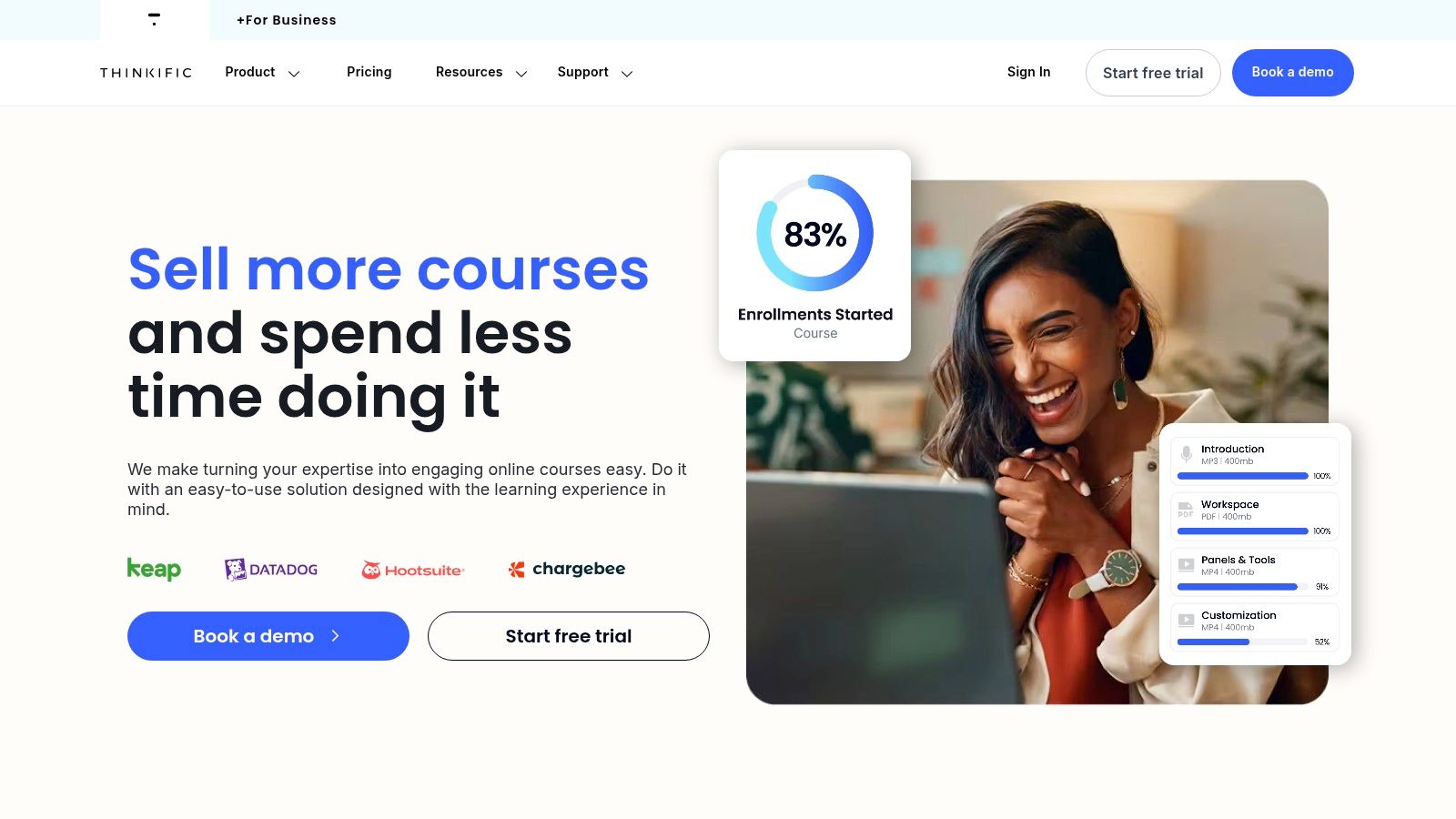
For Shopify store owners, Thinkific allows you to create product training courses, expanding on your product offerings and providing valuable resources for customer engagement. Imagine creating a series of videos demonstrating advanced techniques using your art supplies or a detailed guide on how to best utilize products sold in your Shopify store. This added value can enhance customer loyalty and drive sales. Similarly, arts and crafts business owners can leverage Thinkific to share their expertise through workshops and online courses, teaching specific techniques, showcasing project ideas, and building a community around their craft. Thinkific's custom website builder lets you integrate your course offerings directly into your existing website, maintaining a consistent brand experience for your audience.
Thinkific’s drag-and-drop course builder simplifies the process of creating engaging learning experiences with multimedia content, quizzes, and discussions. Built-in marketing tools, including email marketing and affiliate programs, help you reach a wider audience and promote your courses effectively. The comprehensive analytics dashboard provides valuable insights into student progress and course performance, allowing you to continuously improve and refine your content.
Features:
- Custom website builder with branded domain options
- Drag-and-drop course builder with multimedia content support
- Built-in marketing tools including email marketing and affiliate programs
- Comprehensive analytics and reporting dashboard
- Multiple payment options and flexible pricing models
Pros:
- No transaction fees on any plan: This allows you to maximize your earnings regardless of your chosen pricing tier.
- Excellent customer support with extensive knowledge base: Provides valuable assistance throughout your journey.
- Strong focus on white-labeling and branding customization: Essential for maintaining a consistent brand presence.
- Unlimited courses and students on all paid plans: Offers scalability as your audience grows.
Cons:
- More expensive than some competitors for advanced features: Consider your budget and required features.
- Limited integration options on lower-tier plans: May require upgrading for specific integrations.
- Learning curve for beginners: Takes some time to master all the features.
Pricing: Thinkific offers a free plan and several paid tiers, starting at $49/month, offering increasing features and functionalities.
Website: https://www.thinkific.com/
Thinkific is an excellent choice for entrepreneurs who prioritize brand control and a polished, professional learning environment for their students. It's especially well-suited for those already managing a brand presence through platforms like Shopify and seeking to expand their offerings with high-quality online courses. While there is a learning curve and the price point might be higher than some competitors, the features, flexibility, and focus on branding make Thinkific a strong contender among the best platforms to sell online courses.
3. Teachable
Teachable is a popular choice among creators looking for the best platform to sell online courses, particularly those prioritizing ease of use and effective marketing. Whether you're a Shopify store owner wanting to expand your product offerings with educational content, or an arts and crafts business owner aiming to share your expertise through workshops, Teachable offers a streamlined platform to build and sell your online courses and coaching services. This platform excels at enabling creators, even without technical expertise, to design professional-looking courses and effectively market them to a wide audience. Learn more about Teachable to see how you can integrate this with your existing business.
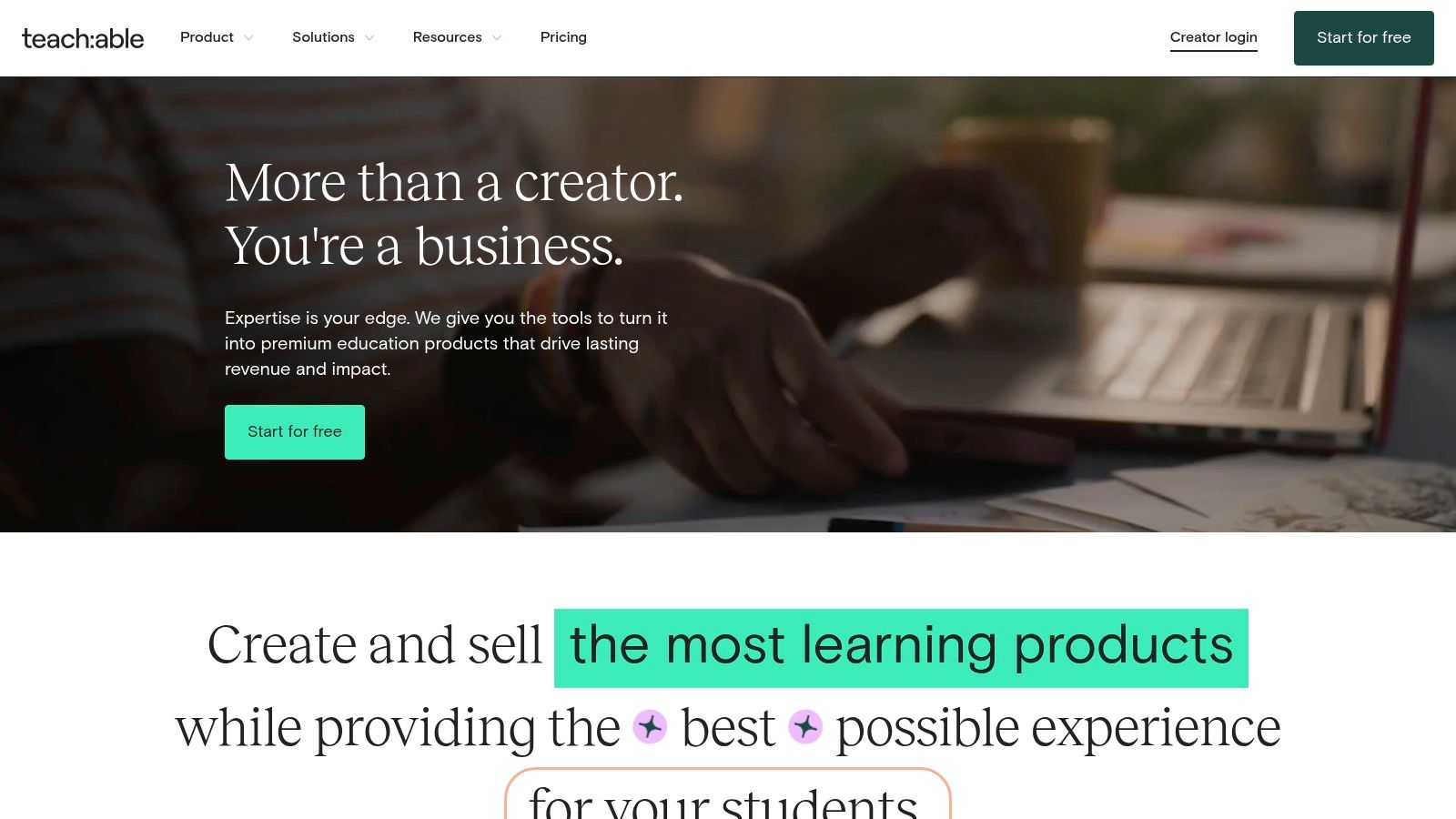
Teachable's user-friendly course builder, complete with customizable templates, makes course creation a straightforward process. You can easily upload your course content, organize it into modules, and create quizzes and assignments. Integrated payment processing supports multiple currencies, simplifying transactions for both you and your students. Its robust sales and marketing tools are another highlight. Features like coupons, affiliate programs, and email marketing integration help you promote your courses and boost sales. For Shopify store owners, this integration can be particularly beneficial, allowing you to cross-promote products and courses to maximize revenue streams. For artisans and crafters, Teachable's marketing features offer an efficient way to reach a broader audience interested in learning your unique skills.
The platform's mobile-responsive design ensures that your students can access your courses seamlessly from any device. This accessibility is crucial in today's on-the-go learning environment. Furthermore, if you offer 1:1 instruction, Teachable provides coaching service features to manage and schedule your sessions effectively. Imagine, as a jewelry maker, offering both online courses on basic techniques and personalized coaching sessions for advanced students - all managed through a single platform.
Pros:
- Intuitive interface: Minimal technical knowledge is required to navigate and utilize the platform effectively.
- Strong sales page capabilities: Build compelling sales pages optimized for conversions.
- Robust student management system: Easily manage student enrollment, progress, and communication.
- Excellent mobile experience: Ensures accessibility for students on any device.
Cons:
- Transaction fees on the basic plan: While higher-tier plans remove transaction fees, the basic plan includes them, impacting your profit margins.
- Limited customization: Compared to some competitors, Teachable offers less flexibility in customizing the look and feel of your course platform.
- Email marketing requires third-party integration for advanced needs: While basic email marketing is included, more advanced features require integration with other services.
Teachable's pricing plans vary based on features and transaction fees. The basic plan includes transaction fees but offers core functionality. Higher-tier plans remove these fees and provide additional features like advanced reporting and priority support.
Teachable stands out as one of the best platforms to sell online courses due to its user-friendly interface, powerful marketing capabilities, and mobile responsiveness. While transaction fees on the basic plan can be a drawback, the platform's ease of use and robust features make it an attractive option for creators seeking a streamlined solution to sell their online courses and grow their audience. Its focus on accessibility and marketing makes it a strong contender for both Shopify merchants seeking diversification and artisans looking to expand their teaching reach. Visit Teachable to explore their platform and pricing options.
4. Kajabi
Kajabi is a robust all-in-one platform specifically designed for knowledge entrepreneurs seeking the best platform to sell online courses, memberships, and other digital products. Unlike platforms that focus solely on course hosting, Kajabi offers a complete ecosystem encompassing product creation, marketing, sales, and community building. This comprehensive approach consolidates all the essential tools for running a successful online business, eliminating the need for numerous disparate software subscriptions. This is particularly advantageous for Shopify store owners and arts and crafts business owners who may already be juggling multiple platforms and are looking for a streamlined solution to expand into the digital product space.

For example, a Shopify store owner selling handmade jewelry could use Kajabi to create and sell online courses teaching jewelry-making techniques. They can then leverage Kajabi's built-in marketing tools to promote these courses directly to their existing customer base, fostering a deeper connection and generating a new revenue stream. Similarly, an arts and crafts business owner could use Kajabi to offer exclusive membership content, providing subscribers with access to premium tutorials, patterns, and community forums.
Kajabi's key features include website building tools with professional templates, advanced marketing automation with pipelines and email sequences, robust membership site capabilities with community features, support for various digital product types beyond courses (like coaching programs and memberships), and a built-in CRM and analytics dashboard. These tools allow for sophisticated marketing strategies, such as creating targeted email sequences based on customer behavior or setting up automated sales funnels to maximize conversions.
Pros:
- Comprehensive solution: Kajabi replaces the need for multiple software tools, saving time and money in the long run.
- Professional design: Pre-built templates and customization options enable the creation of visually appealing and professional online presence.
- No transaction fees: Regardless of your chosen plan, Kajabi doesn't take a cut of your sales.
- Advanced marketing: Sophisticated marketing tools, including sales funnels and automation, enable powerful growth strategies.
Cons:
- Higher price point: Kajabi is more expensive than many competitors, which might be a barrier for those just starting.
- Learning curve: The extensive feature set can be overwhelming initially and requires some time to master.
- Product limits: Lower-tier plans restrict the number of products you can create.
Learn more about Kajabi and see how it compares to other popular platforms. This resource can help you weigh your options and make an informed decision based on your specific needs and budget. While Kajabi's pricing is higher, its all-in-one nature and advanced features can be a valuable investment for serious online entrepreneurs. Kajabi’s pricing starts at $149/month for the Basic plan, $199/month for the Growth plan, and $399/month for the Pro plan. Technical requirements are minimal, as Kajabi is a cloud-based platform accessible through a web browser.
Setting up your Kajabi account is relatively straightforward. Begin by choosing a template for your website and customizing it to reflect your brand. Next, create your online course or digital product, utilizing Kajabi's intuitive course builder. Then, set up your marketing automations and sales funnels to streamline your sales process. Finally, integrate your existing marketing tools and start promoting your offerings. While the initial setup might take some time due to the platform’s breadth of features, the long-term benefits of having a centralized system for your entire online business are significant.
5. Podia: A Streamlined Platform for Selling Your Expertise
Podia presents a compelling option for Shopify store owners and arts and crafts business owners looking for the best platform to sell online courses. Its all-in-one approach simplifies the process of creating, hosting, and selling not only online courses, but also digital downloads, memberships, and webinars. This makes it particularly attractive for those wanting to diversify their income streams beyond physical products or offer valuable supplementary content to enhance customer engagement. Imagine a Shopify store selling handmade jewelry also offering online courses on jewelry making, or a pottery artist selling both their creations and online tutorials. Podia empowers you to do just that. It removes the technical hurdles, allowing you to focus on your craft and your customers. Its intuitive interface and streamlined setup are ideal for beginners who might be new to the world of online education.
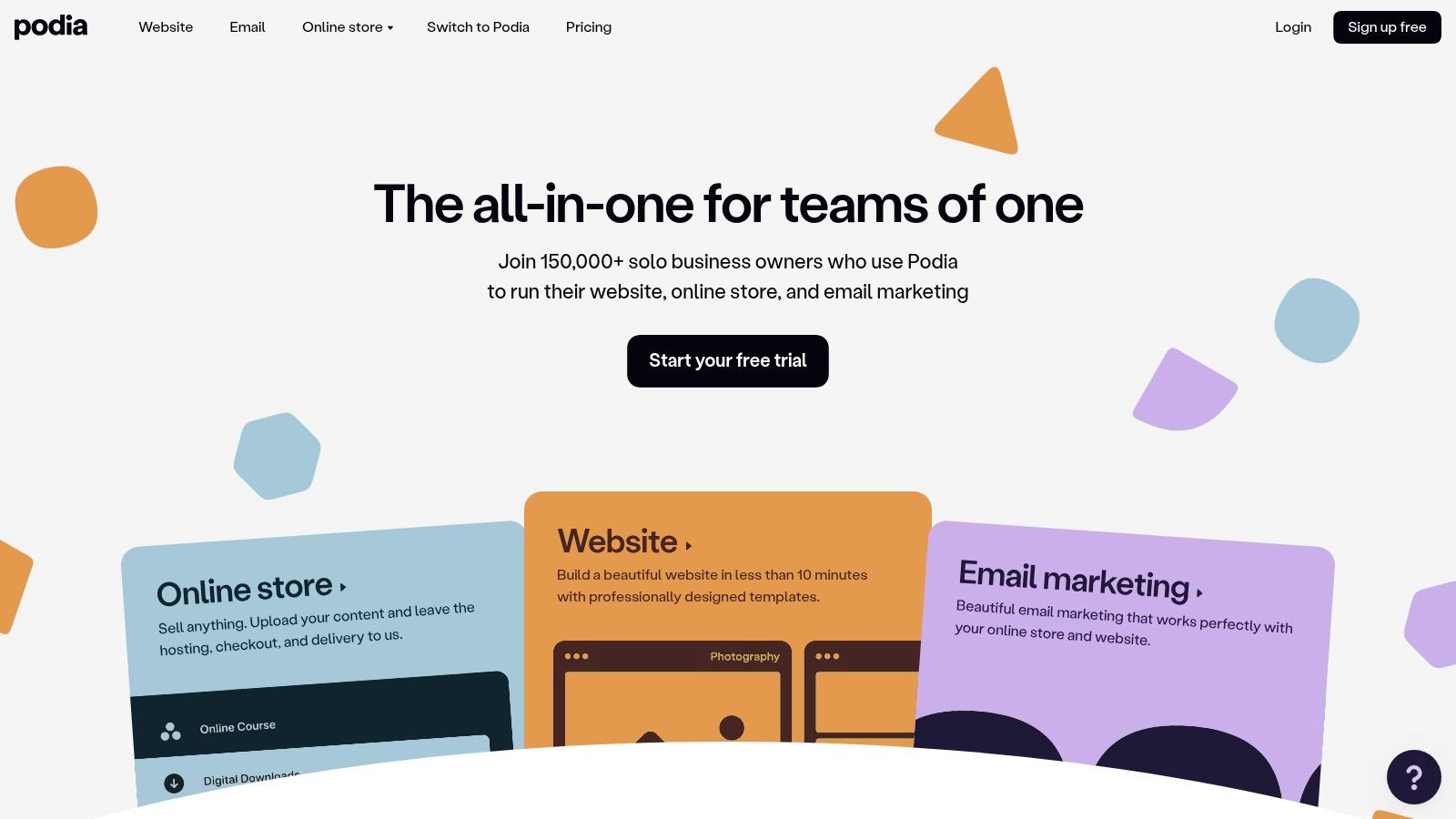
Podia's simplicity doesn't mean a sacrifice in features. You get unlimited everything – courses, students, bandwidth – even on their basic plan. Built-in email marketing helps you nurture your audience and promote your courses directly to your customer base. The integrated messaging system facilitates direct communication with your students, fostering a sense of community. The platform also boasts a built-in affiliate marketing program, allowing you to leverage the power of partnerships to expand your reach. Furthermore, Podia handles all the technical aspects, including unlimited hosting for your videos, course materials, and other digital products.
For Shopify store owners, this integrated approach can be particularly beneficial. You can cross-promote your courses to your existing customer base, offering valuable add-ons or related educational content. For example, a Shopify store selling art supplies could offer online painting courses through Podia, creating a synergistic ecosystem that benefits both your bottom line and your customer's creative journey. Similarly, arts and crafts business owners can leverage Podia to teach their unique skills and techniques, expanding their reach beyond local workshops and classes.
Pricing: Podia offers two main pricing tiers: the "Mover" plan and the "Shaker" plan. Both plans offer no transaction fees, making it easy to calculate your profit margins. The "Shaker" plan unlocks additional features such as memberships, webinars, and an affiliate marketing program. Checking their website for the most up-to-date pricing is recommended.
Pros:
- No transaction fees: Keep more of your earnings.
- Simple pricing: Clear and transparent pricing structure.
- Excellent customer support: 7 days a week availability.
- All-in-one platform: Minimize the need for additional tools.
Cons:
- Limited customization: Less design flexibility than some competitors.
- Limited advanced marketing features: May require third-party integrations for more complex marketing campaigns.
- Fewer integration options: Not as many integrations as some more established platforms.
Implementation Tips:
- Start with a free trial to explore the platform and its features.
- Plan your course content and structure before uploading it to Podia.
- Utilize the built-in email marketing tools to promote your courses.
- Leverage the affiliate marketing program to expand your reach.
Podia's strength lies in its simplicity and ease of use, making it one of the best platforms to sell online courses for creators who prioritize a streamlined experience. Its all-in-one approach, coupled with zero transaction fees, offers excellent value, particularly for those starting their online course journey. Visit Podia
6. LearnWorlds
LearnWorlds is a robust platform specifically designed for creating and selling engaging and interactive online courses. If you're looking for a platform that prioritizes a rich, immersive learning experience and offers extensive customization, LearnWorlds is a strong contender among the best platforms to sell online courses. It’s particularly well-suited for educators and businesses who want to offer a premium learning experience and build a thriving online community. Think of it as the platform for creators who are serious about online education and want more control over branding and the student journey.
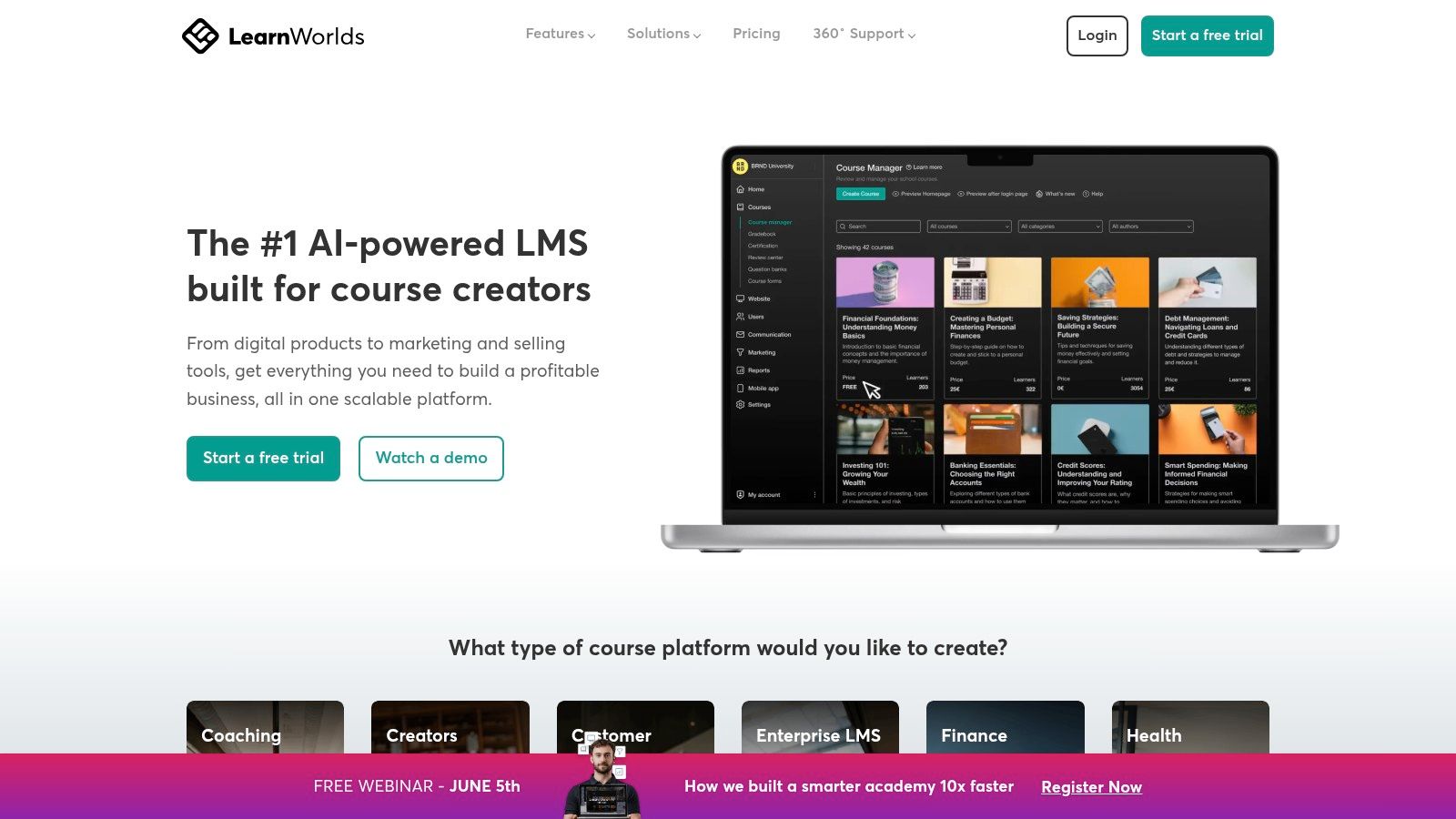
For Shopify store owners and arts and crafts business owners, LearnWorlds presents a powerful opportunity to expand your offerings and generate new revenue streams. Imagine supplementing your product sales with online courses teaching specific techniques, crafting skills, or business strategies. For example, a Shopify store selling knitting supplies could offer online knitting courses, and an arts and crafts business owner could teach painting techniques through interactive video tutorials. This creates a valuable synergy, driving traffic between your Shopify store and your LearnWorlds courses.
LearnWorlds boasts an impressive suite of features designed for interactive learning. Its interactive video player allows you to embed notes, quizzes, and titles directly within the video, keeping students engaged and reinforcing key concepts. The built-in social network fosters a sense of community, allowing students to interact with each other and the instructor, further enhancing the learning experience. Advanced assessment tools and a certificate builder provide a structured learning path and a sense of accomplishment for students.
Furthermore, LearnWorlds offers custom mobile app options, allowing you to create a branded learning experience accessible anytime, anywhere. This is a significant advantage for busy learners and further distinguishes your brand. The platform also supports SCORM compliance, enabling you to easily import and export learning content. White-labeling capabilities allow you to completely customize the platform to match your brand, creating a seamless and professional learning environment.
Features:
- Interactive video player with notes, titles, and questions
- Built-in social network for community learning
- Advanced assessment tools and certificate builder
- Custom mobile app options for branded learning
- SCORM compliance and white-label features
Pros:
- Superior interactive content creation tools
- Excellent course protection and copyright features
- Strong focus on learning experience and engagement
- Comprehensive white-labeling capabilities
Cons:
- Transaction fee on the starter plan
- Steeper learning curve for beginners
- Higher price point for advanced features (though this is often justified by the powerful feature set)
Pricing: LearnWorlds offers several pricing tiers, starting with a basic plan that includes a transaction fee. Higher-tier plans unlock more features, remove transaction fees, and offer increased bandwidth and student capacity. It’s advisable to review their pricing page for the most up-to-date information.
Technical Requirements: As a cloud-based platform, LearnWorlds doesn’t require any specific software installations. A stable internet connection and a modern web browser are all you need to access and manage your courses.
Implementation Tips:
- Plan your course content carefully and leverage the interactive tools to maximize engagement.
- Utilize the built-in social network to foster a sense of community and encourage interaction among your students.
- Take advantage of the white-labeling features to create a consistent brand experience.
- Consider offering a free introductory course to attract students and showcase the value of your paid courses.
LearnWorlds (https://www.learnworlds.com/) might require a bit more time to master compared to simpler platforms, but the investment is worthwhile if you’re serious about delivering a high-quality, engaging learning experience and building a strong online presence as an educator or business owner. Its robust features and customization options make it a top choice for those looking for the best platform to sell online courses, particularly if creating a premium learning experience and fostering a strong community are top priorities.
7. Udemy
Udemy is a massive open online course (MOOC) platform, making it one of the best platforms to sell online courses if you're looking for vast reach. It connects instructors with a global audience of over 40 million students eager to learn new skills. Unlike platforms where you build and manage your own online course website, Udemy provides a centralized marketplace. This means you leverage their existing infrastructure, student base, and marketing power. This makes it particularly appealing for Shopify store owners and arts and crafts business owners who may not have the time or technical expertise to build their own platform from scratch. Think of it like setting up shop in a bustling marketplace versus building your own store in a deserted area. You gain instant access to foot traffic. Udemy handles everything from payment processing to customer service, allowing you to focus on creating and delivering high-quality content.

For Shopify store owners, Udemy offers a unique opportunity to expand your product offerings and reach a wider audience. For instance, if you sell handcrafted jewelry, you could create a Udemy course teaching jewelry-making techniques. This not only generates a new revenue stream but also drives traffic back to your Shopify store where students can purchase supplies or finished pieces. Similarly, arts and crafts business owners can leverage Udemy to teach their craft, building a community around their brand and increasing product visibility. Imagine a pottery artist offering a beginner's course on wheel throwing - this attracts potential customers to their unique artistic style and drives sales of their handcrafted pottery.
Udemy provides comprehensive course creation tools with quality guidelines, promotional tools, marketing opportunities, student engagement features (like Q&A sections), and a built-in review system for valuable social proof. While there are no upfront costs to join, Udemy takes a significant revenue share (50-75%) for sales generated through their marketplace. However, instructors retain a much larger percentage of the revenue from students they bring directly to the platform through their own marketing efforts.
Features:
- Access to a massive global audience of potential students
- Course creation tools with quality guidelines
- Promotional tools and marketing opportunities
- Student engagement and Q&A features
- Built-in review system for social proof
Pros:
- No upfront costs to join the platform
- Built-in audience with discovery features
- Handles all payment processing and customer service
- Marketing and promotional support
Cons:
- High revenue share (Udemy takes 50-75% of revenue for marketplace sales)
- Limited control over pricing and discounting
- Strong competition with thousands of courses on similar topics
- Less ability to build your own brand
Implementation/Setup Tips:
- Niche down: With so much competition, focusing on a specific niche within your broader area of expertise is crucial for success.
- Engage with students: Actively participate in Q&A sessions and respond to reviews to build a loyal following.
- Promote your course: Don’t rely solely on Udemy's marketing. Leverage your own social media, email list, and Shopify store to drive traffic to your course.
- Consider a multi-platform approach: Use Udemy for reach but also explore other platforms that offer more control over branding and pricing, allowing you to cultivate a direct relationship with your students.
Udemy is a powerful platform for reaching a large audience quickly and easily, making it a viable option for those seeking the best platform to sell online courses. However, the trade-off for this convenience is a high revenue share and less control over branding. Carefully weigh these pros and cons against your specific business goals and consider a multi-platform strategy to maximize your reach and revenue. Udemy
8. WordPress with LearnDash
For those seeking maximum control and flexibility over their online course platform, WordPress with LearnDash is a powerful contender among the best platforms to sell online courses. Unlike all-in-one platforms, LearnDash leverages the popular WordPress CMS, giving you complete ownership of your content and branding. This makes it an especially appealing option for Shopify store owners and arts and crafts business owners who already have a WordPress presence and want to extend their offerings to include online courses. It empowers you to integrate your course platform seamlessly with your existing website and branding.
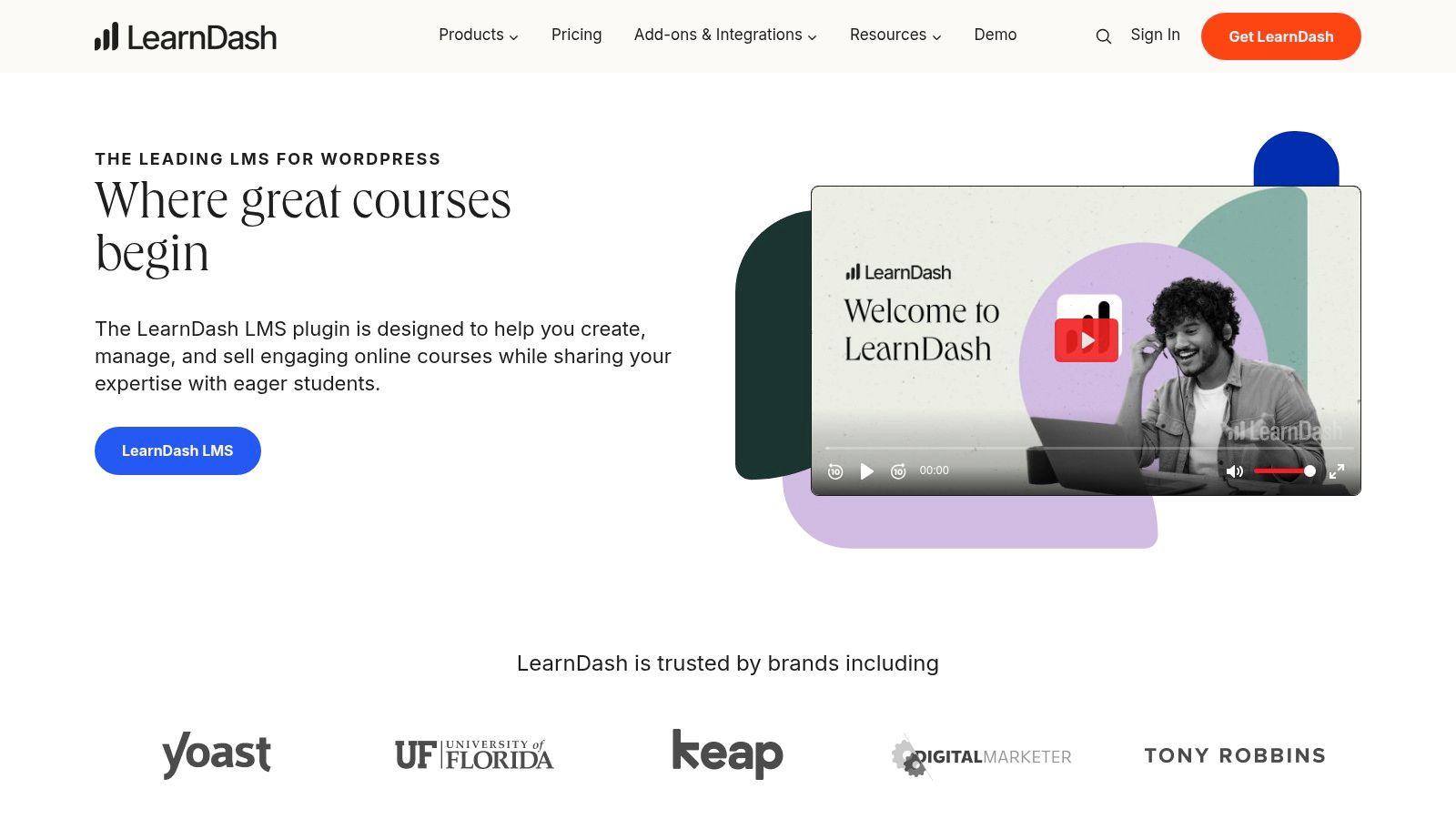
LearnDash is a premium WordPress plugin that transforms a standard WordPress installation into a full-fledged Learning Management System (LMS). This means you can leverage the vast WordPress ecosystem of themes, plugins, and developers to customize your platform extensively. Imagine selling your handcrafted jewelry on your Shopify store and then offering online courses teaching jewelry-making techniques, all within a cohesive brand experience. This integrated approach can significantly boost customer engagement and create new revenue streams. Learn more about WordPress with LearnDash and see how it stacks up against other options.
LearnDash offers advanced course-building features, allowing you to structure your content with lessons, topics, quizzes, and multimedia elements. You can also implement drip content to release lessons gradually, assignments to evaluate student progress, and certificates upon completion. For example, an arts and crafts business owner could create a course with weekly lessons, downloadable project templates, and quizzes to assess understanding, culminating in a certificate of completion. The platform also fosters community engagement with dynamic forums and user groups.
While LearnDash provides robust features, it does require more technical setup than all-in-one platforms. You'll need to install WordPress, the LearnDash plugin, and potentially other plugins for added functionality like payment gateways and email marketing integration. You're also responsible for hosting, security, and maintenance of your website.
Features:
- Complete ownership and control over your platform
- Advanced course structuring with lessons, topics, and quizzes
- Flexible prerequisite and drip content options
- Dynamic forums and user groups
- Extensive add-on and integration ecosystem
Pros:
- One-time payment option (starting at $159 for a single site license) rather than a recurring monthly subscription.
- No transaction fees or revenue sharing, meaning you keep all the profits from your course sales.
- Unlimited customization potential thanks to the WordPress ecosystem.
- Seamless integration with the existing WordPress ecosystem.
Cons:
- Requires technical knowledge or assistance for initial setup and ongoing maintenance.
- Additional costs for hosting, themes, and other plugins.
- Responsibility for website security and maintenance.
- Marketing tools require additional integrations.
If you're comfortable with WordPress or willing to invest in technical assistance, LearnDash offers an unparalleled level of customization and control for building a successful online course business. This platform is particularly well-suited for creators who value ownership and want to avoid recurring platform fees and revenue sharing. For Shopify store owners and arts and crafts businesses, the ability to seamlessly integrate online courses within their existing WordPress ecosystem can significantly enhance their brand and customer experience.
Top 8 Online Course Platforms Comparison
| Platform | Core Features/Unique Selling Points ✨ | User Experience & Quality ★★★★☆ | Value & Pricing 💰 | Target Audience 👥 | Notes / Highlights 🏆 |
|---|---|---|---|---|---|
| Tevello 🏆 | Seamless Shopify integration, customizable courses, community tiers | Highly rated, smooth Shopify UX, robust video hosting | Free trial, subscription-based modules | Shopify store owners & digital educators | Best Shopify-centric course + community platform |
| Thinkific | Drag-drop builder, marketing tools, analytics | Strong branding/customization, no transaction fees | Free plan available, paid tiers vary | Educators, course creators | Good for full control & branding |
| Teachable | Easy course builder, sales & marketing tools | Intuitive interface, mobile-responsive | Transaction fees on basic plan | Creators wanting quick setup | Strong marketing features |
| Kajabi | All-in-one business platform: marketing, sales, community | Professional templates, advanced funnels | Higher price point | Knowledge entrepreneurs | Comprehensive but costly |
| Podia | Simple interface, all-in-one for courses & memberships | User-friendly, unlimited hosting | Straightforward pricing, no transaction fees | Beginners & creators wanting simplicity | Easy to use, fewer advanced options |
| LearnWorlds | Interactive videos, social learning, SCORM compliance | Superior engagement tools, detailed customization | Higher pricing, starter fee with transaction | Serious educators & interactive courses | Focus on engagement |
| Udemy | Massive marketplace, built-in audience & marketing | Large student base, built-in review system | No upfront cost, high revenue share for sales | Instructors seeking wide reach | Marketplace model limits control |
| WordPress with LearnDash | Full ownership, advanced course tools, quizzes, forums | Highly customizable but technical setup required | One-time payment + hosting costs | Tech-savvy educators & businesses | Maximum control, no revenue sharing |
Launch Your Online Course Today: Empowering Education, One Platform at a Time
Choosing the best platform to sell online courses is crucial for both educators and entrepreneurs. From Shopify store owners seeking to expand their product offerings to arts and crafts business owners wanting to share their skills, finding the right online course platform can significantly impact your success. This article has explored eight top contenders, including versatile options like Thinkific, Teachable, Kajabi, Podia, and LearnWorlds; marketplace giants like Udemy; the robust WordPress plugin LearnDash; and the Shopify-integrated solution, Tevello. Each platform offers unique features catering to different needs and budgets. Key takeaways to remember when selecting your platform include considering your technical skills, marketing requirements, pricing structure, and the level of customization and control you desire.
Building and launching a platform for your online course can be a significant undertaking. If you're interested in a more streamlined, niche approach, explore the concept of Micro SaaS. There's a great article on how to build a micro saas from AnotherWrapper. This approach can be particularly appealing if you're aiming for a highly specialized audience.
Finding the perfect fit among the best platforms to sell online courses is about aligning your goals with the right tools. By carefully weighing the pros and cons discussed in this article, you're well-equipped to make an informed decision. Whether you're looking for a simple, user-friendly interface or a highly customizable experience, the right platform is out there, ready to help you empower learners and share your expertise.
Looking for a seamless integration with your Shopify store to sell online courses? Tevello offers a powerful, streamlined solution designed specifically for Shopify merchants. Learn more about how Tevello can help you expand your offerings and connect with your audience today!




